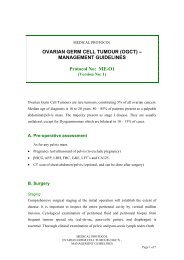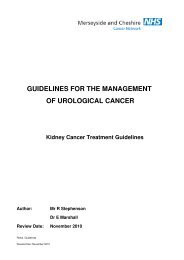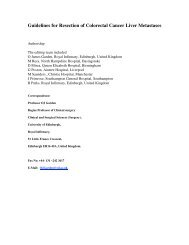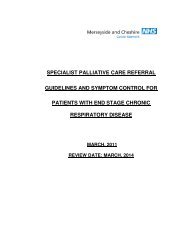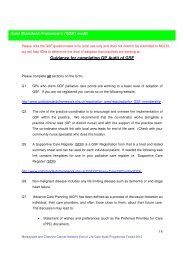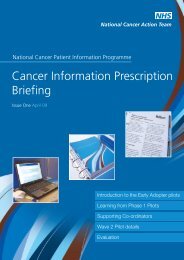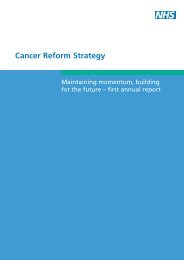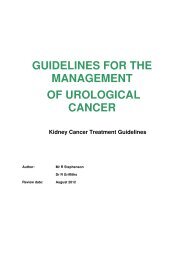Cancer Reform Strategy - NHS Cancer Screening Programmes
Cancer Reform Strategy - NHS Cancer Screening Programmes
Cancer Reform Strategy - NHS Cancer Screening Programmes
- No tags were found...
You also want an ePaper? Increase the reach of your titles
YUMPU automatically turns print PDFs into web optimized ePapers that Google loves.
74 CANCER REFORM STRATEGYconsider creating this post and to identifypatient information leads in each trust inthe network.5.24 Providers will wish to consider how theycan best audit information delivered toindividual patients and whether this is meetingpatients’ needs. Particular attention should bepaid to the needs of at risk groups.Decision-making and choice5.25 Patients with cancer vary in the extent towhich they wish to be involved in decisionmaking.Some wish to take an active role,others wish to share decision-making with thehealth professionals caring for them and otherswish to adopt a passive role. Patients should befree to adopt any one of these roles, or indeedto be active about some aspects of their careand passive about others. One of theresponsibilities of a clinician caring for a patientis to discover from the patient what role or rolesthey want to adopt and to ensure that,irrespective of their decision, they are treatedwith dignity and respect.5.26 Some patients will wish to make choicesabout the team or hospital they want to delivercare at different points in the care pathway.They should be able to do so, choosing fromproviders that are compliant with relevantImproving Outcomes Guidance. In order tomake choices that are appropriate to their owncircumstances patients will need goodinformation on the availability of services andon outcomes. Chapter 8 sets out how we willcollect and publish data on services andoutcomes through the establishment of a majornew cancer intelligence initiative.5.27 Experience outside cancer and frominternational settings has shown that theintroduction of the offer of choice can result inimprovements in service quality and timeliness.Services which are below average may beincentivised to put things right, so as not to losepatients to other providers.5.28 It is important to recognise that choice isnot simply about the location of care. Patientstold us that they expect to be told of all clinicallyappropriate treatments, even if those treatmentswere not funded by the <strong>NHS</strong> (see chapter 4).Examples of the types of choices that patientsmight have in the future are set out below.5.29 One important use of information is tohelp patients make informed treatment choices.Box 27: ChoiceChoice of TreatmentA woman with a large cancerin her left breast would berecommended to undergo amastectomy (removal of thebreast). Some hospitals canoffer immediate breastreconstruction but in othersthe patient will need aseparate operation at a laterdate. A patient may wish tochoose the team that offersthe same day operation.Choice of TreatmentA man with bowel cancerneeds surgery to remove thetumour. His surgeon canperform a standard operationto remove it requiring amajor incision and hospitalstay of around 10-14 days.A team in a neighbouringhospital have recently beentrained to remove suchtumours using a new keyholesurgical technique offering afaster recovery time. He maywish to choose the newtreatment, even if it meanstravelling further.Choice of LocationA patient living in Exeter isdiagnosed with throat cancerand needs radiotherapyrequiring 30 dailyattendances at hospital over6 weeks. He would prefer tohave this treatment in Derby,where his daughter lives andwould like to be able tochoose to have the treatmentthere instead.



